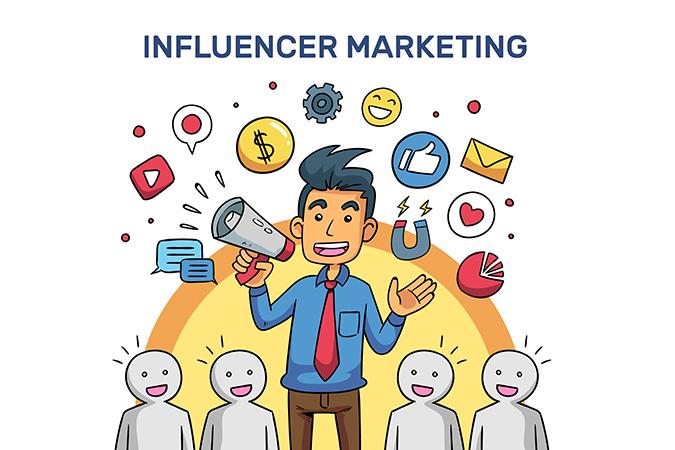In today’s digitally-driven marketplace, where the lines between shopping and storytelling are increasingly blurred, brands find themselves navigating a complex landscape teeming with opportunities and challenges. Enter influencer marketing—a dynamic strategy that bridges the gap between authenticity and audience engagement. As e-commerce continues to flourish at an unprecedented rate, the power of influencers has emerged as a formidable tool for driving sales and cultivating brand loyalty. This article delves into the intricacies of harnessing influencer marketing to unlock the secrets of e-commerce success, exploring how partnerships with the right voices can amplify your brand’s narrative and resonate with consumers in profound ways. Join us as we unpack the strategies and insights that can transform mere transactions into meaningful exchanges, paving the way for a thriving online retail experience.
Understanding the Impact of Influencer Trust on Brand Perception
In the rapidly evolving landscape of e-commerce, the relationship between influencers and their followers can significantly alter a brand’s image. When influencers genuinely resonate with their audience, they foster an environment of trust that can enhance perception. A study indicated that nearly 70% of millennials base their purchasing decisions on social media recommendations, emphasizing the importance of aligning with influencers who authentically represent brand values. Brands that partner with trusted influencers can expect not only greater reach but also higher engagement, as followers are more inclined to value the message when it stems from a source they admire.
Establishing a robust partnership with influencers requires a careful understanding of the demographics they appeal to and the ethos they embody. Brands must evaluate the following core elements:
- Relevance: Does the influencer align with your brand’s mission?
- Engagement: How actively does the influencer communicate with their audience?
- Authenticity: Is the influencer perceived as genuine by their followers?
Investing time to assess these factors can yield fruitful results, creating a synergistic effect that not only elevates brand visibility but also establishes a deeper, lasting relationship with consumers. The interplay of influencer trust and brand perception unfolds an avenue for brands to enhance customer loyalty and drive long-term success.

Crafting Authentic Collaborations to Drive Consumer Engagement
In the dynamic landscape of e-commerce, engaging target audiences requires more than just effective advertising; it necessitates building genuine relationships. Authentic collaborations with influencers, who resonate with your brand’s ethos, create a compelling narrative that draws consumers in. These partnerships are not merely transactional but are storytelling opportunities that foster loyalty and trust. When influencers share their personal experiences with a product, it feels like a recommendation from a friend rather than a corporate message. This can significantly boost consumer engagement, driving traffic and conversions.
To ensure the success of these collaborations, brands must prioritize careful selection of influencers based on their audience, values, and engagement levels. Consider the following factors when crafting partnerships:
- Authenticity: Look for influencers who align with the brand’s mission.
- Audience Insights: Analyze the influencer’s followers and engagement rates.
- Content Style: Ensure their content resonates with your target demographic.
Moreover, creating shared campaigns allows for a seamless blend of content—from unboxing videos to behind-the-scenes looks. This strategy not only heightens visibility but also reinforces community sentiments, making consumers feel like they belong in a shared experience. When both brands and influencers work together authentically, the results can lead to a ripple effect of increased engagement and broader reach.

Leveraging Data Analytics for Targeted Influencer Campaigns
Data analytics is the cornerstone of crafting effective influencer marketing strategies, enabling brands to identify and engage with the right influencers who resonate with their target audience. By analyzing metrics such as engagement rates, audience demographics, and interaction patterns, marketers can pinpoint influencers whose followers align with their brand ethos. This targeted approach not only maximizes the return on investment but also enhances brand credibility, as collaborations stem from authentic connections rather than mere popularity.
Moreover, leveraging data allows for the continuous optimization of influencer campaigns. By tracking performance indicators such as conversion rates and click-through ratios in real time, brands can quickly adjust their strategies to improve outcomes. Here are some key benefits of integrating analytics into influencer marketing:
- Enhanced Audience Insights: Understanding followers’ interests and behaviors leads to more relevant partnerships.
- Improved ROI Measurement: Clear visibility into campaign performance helps in justifying marketing spend.
- Strategic Content Creation: Data-driven insights inform the type of content that resonates with audiences.

Navigating Challenges and Measuring Success in Influencer Marketing
In the dynamic world of influencer marketing, brands often face a myriad of challenges that can hinder their campaigns. One major hurdle is identifying the right influencers who align with their values and understand their target audience. It’s crucial to consider not only the influencer’s follower count but also their engagement rates and authenticity. Additionally, managing relationships with influencers requires ongoing communication and a clear understanding of each party’s expectations. To ensure seamless collaboration, brands can invest in tools that assist in discovering influencers, tracking metrics, and optimizing campaigns.
Measuring success in influencer marketing is equally vital yet complex. Metrics such as engagement rate, reach, and conversion rate provide valuable insights into campaign performance. Leveraging these metrics allows brands to evaluate not only how influencers are impacting brand awareness but also their actual contribution to driving sales. It is essential to establish Key Performance Indicators (KPIs) beforehand, ensuring that all stakeholders have a clear outlook on what success looks like. Below is a simple illustration of the different success metrics that can be used:
| Metric | Description |
|---|---|
| Engagement Rate | Measures likes, comments, shares, and saves relative to follower count. |
| Brand Reach | Total number of people who have seen the content shared by influencers. |
| Conversions | Percentage of users who took a desired action, such as making a purchase. |
| Return on Investment (ROI) | Compares campaign gains against costs, highlighting profitability. |
Closing Remarks
As we wrap up our exploration of influencer marketing’s pivotal role in unlocking e-commerce success, it becomes clear that this innovative strategy is more than just a trend—it’s a fundamental shift in how brands connect with consumers. By harnessing the authenticity, reach, and engagement that influencers offer, businesses can create meaningful relationships that transcend traditional marketing approaches.
In a rapidly evolving digital landscape, understanding and utilizing the power of influencers can set a brand apart from the competition, driving not just sales, but genuine loyalty. As you venture into the world of e-commerce, remember that every partnership is an opportunity to tell your story in a compelling way that resonates with your audience.
Embrace the dynamic nature of influencer marketing, and you may just find that the key to unlocking unprecedented e-commerce success lies in the authenticity of shared voices and experiences. The future is bright, and the possibilities are endless. Now, go forth and create connections that captivate and convert!



